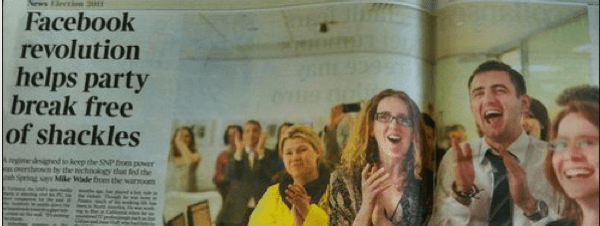The story of how the SNP subverted an electoral system specifically designed to keep them from gaining a majority in the Scottish Parliament elections a few days ago is one which rewards closer attention. There are valuable lessons here for anyone interested in politics, the social web and activism.
More broadly it is about disrupting the status quo using design thinking and social media to create a movement of passionate supporters.
Ewan McIntosh, whose work I have followed with great interest for years, was brought in as co-director of the SNP’s digital strategy when victory seemed a long way off…
When I started work on the campaign’s digital strategy and tactics, with 100 days to go to polling day, all polls indicated that the Labour party were set to win: at one point we were 15 points behind challengers, the Labour party.
We redrew the political map of Scotland and, by engaging every demographic out there, helped make concrete the fact that the SNP really isScotland’s National Party.
We helped shift the public viewpoint from one where, six weeks ago, the party languished some 10-15 points behind Labour, to one where it finished with an outright majority of 69 seats in the 129 seat Parliament, a majority of Scots wanting a Scottish government working for Scotland in the form of the SNP.
Ewan McIntosh’s blog post on his edu.blogs.com talks about some of the lessons. While aimed at those in the education sector, there are things we can all learn from here. I especially like his point that:
Online activism is not PR: it actually creates change in the real world (including that most critical of offline actions in an election: vote for us), rather than just creating the perceptionthat something is changing in the real world.
Most school websites are PR. Good school Facebook pages are relentlessly appearing on parents’ and pupils’ own feeds, at all times of the day and night, creating offline actions that are desirable (do your homework, here’s some help, this parents’ evening looks interesting – I might head along for it).
What you say is not enough to build your reputation, what you do is much more important. This counts for individuals as well as organisations, naturally.
The clients I’ve worked with that have made the most of social media, gone furthest fastest, are the ones that know hat they are about and live their principles. People who want to talk a good game but don’t have much substance are
It’s why social media programmes are best thought of as agents for change, best deployed as part of organisational – or in the SNP’s case, systemic – revolutions.
Anyway, take a look at Ewan’s Edu Blogs post and the one on his account of the SNP’s victory on his consultancy website. They are thrilling accounts of someone in the thick of it, as it were, of politics and who brought his design thinking and social media knowledge and skills to bear to stunning effect.

Leave a Reply
You must be logged in to post a comment.